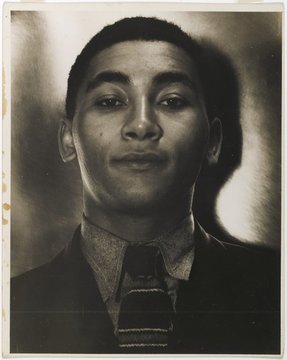Angelo Herndon facts for kids
Angelo Braxton Herndon (born May 6, 1913, died December 9, 1997) was an African-American labor organizer. He became famous after being arrested in 1932 for trying to organize both Black and white workers in Atlanta, Georgia. Police found "communist literature" in his hotel room, which was a big part of the case against him.
Angelo Herndon was helped by the International Labor Defense, a group connected to the Communist Party USA. They hired two young lawyers, Benjamin J. Davis Jr. and John H. Geer. Over five years, Herndon's case went to the Supreme Court of the United States twice. The Supreme Court finally decided that Georgia's law against "insurrection" was unconstitutional. This meant it went against the First Amendment rights of free speech and peaceful gathering. Herndon's case became very important across the country. It made people look closely at how justice was handled in the Southern states. Later in his life, Herndon left the Communist Party and lived a quiet life.
Angelo Herndon's Early Life
Angelo Herndon grew up in a poor family in Ohio. He faced unfair treatment because he was African American. When he was 14, he moved to Kentucky to work in the mines. By 1930, he was working in Alabama.
When he was young, a white worker gave Herndon a copy of the Communist Manifesto. This book was about communism. He was impressed by how the Communist Party worked in the South. They tried to improve conditions for workers and bring Black and white people together. They taught about racial equality and how different social classes often had conflicts. Herndon joined the party in 1930. After being arrested several times in Alabama for organizing workers, he moved to Atlanta, Georgia, in late 1931.
Fighting for Workers' Rights
Herndon went to Atlanta to organize workers for the Unemployment Council. This group was trying to help people who had lost their jobs. His work with the Communist Party made him well-known across the country. He worked to get both Black and white working-class people involved in politics. He invited both groups to join the Communist Party of Atlanta, which was integrated.
On June 30, 1932, nearly 1,000 unemployed workers, both Black and white, protested at the federal courthouse. They wanted their relief payments to start again. Officials were worried because the protest included both Black and white people. This was unusual in the segregated South, where "Jim Crow" laws kept races separate. Police began watching people they thought were radical. On July 11, Herndon was arrested by Atlanta police detectives. A few days later, they searched his hotel room and found Communist Party writings. First, Herndon was charged just for being a communist. Then, he was charged with "insurrection" under an old Georgia law from the Reconstruction era. This law was meant to stop rebellions.
Herndon was held in jail for almost six months. He was released on Christmas Eve after the International Labor Defense paid his $7,000 bail. On January 18, 1933, an all-white jury found Herndon guilty. His young lawyers, Benjamin J. Davis Jr. and John H. Geer, were hired by the ILD. The prosecutor wanted Herndon to get the death penalty for having communist literature. However, Geer and Davis pointed out that the same literature could be found in public libraries. Herndon was sentenced to 18 to 20 years of hard labor, which meant working on a chain gang.
On December 7, 1935, a state appeals court overturned Herndon's conviction. He was released on bail. But then the Georgia Supreme Court said his original conviction was correct. So, Herndon went on a national speaking tour in 1936. He spoke to crowds in places like Denver, Colorado, and Kansas City, Missouri. He wanted to raise awareness about his case while his lawyers appealed it to the US Supreme Court.
On April 26, 1937, the United States Supreme Court ruled in Herndon's favor. By a close vote of five to four, they said Georgia's "insurrection" law was unconstitutional. They agreed it violated the First Amendment, which protects a person's right to free speech and to gather peacefully. When Herndon returned to New York City, a crowd of 6,000 people welcomed him as a hero. Several important Communist Party officials were there to greet him.
On October 13, 1937, Angelo's brother Milton was killed fighting in the Spanish Civil War. Milton was also a Communist Party member.
In the 1940s, Herndon started the Negro Publication Society of America. This group published a newspaper called The People's Advocate in San Francisco, California.
By the end of the 1940s, Herndon left the Communist Party. He moved to the Midwest and worked as a salesman, living a quiet life.
Writings
- The Case of Angelo Herndon, New York: Joint Committee To Aid the Herndon Defense, 1935.
- The Road to Liberation for the Negro People (with others), New York: Workers Library Publishers, 1939.
 | Claudette Colvin |
 | Myrlie Evers-Williams |
 | Alberta Odell Jones |


